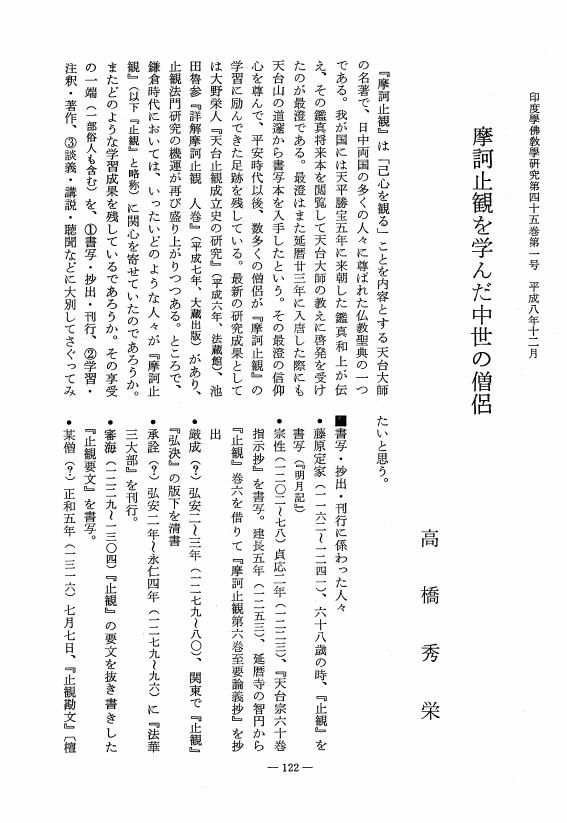1 0 0 0 有部の有の論證の史的展開
- 著者
- 福原 亮嚴
- 出版者
- 日本印度学仏教学会
- 雑誌
- 印度學佛教學研究 (ISSN:00194344)
- 巻号頁・発行日
- vol.7, no.1, pp.233-236, 1958
1 0 0 0 華嚴における業:有部の業説と比較して
- 著者
- 福原 亮嚴
- 出版者
- 日本印度学仏教学会
- 雑誌
- 印度學佛教學研究 (ISSN:00194344)
- 巻号頁・発行日
- vol.15, no.1, pp.56-62, 1966
1 0 0 0 三性三無性の源流
- 著者
- 福原 亮厳
- 出版者
- 日本印度学仏教学会
- 雑誌
- 印度學佛教學研究 (ISSN:00194344)
- 巻号頁・発行日
- vol.20, no.2, pp.496-502, 1972
1 0 0 0 OA 明恵上人遺訓について
- 著者
- 小泉 春明
- 出版者
- Japanese Association of Indian and Buddhist Studies
- 雑誌
- 印度學佛教學研究 (ISSN:00194344)
- 巻号頁・発行日
- vol.30, no.1, pp.179-182, 1981-12-31 (Released:2010-03-09)
1 0 0 0 OA 六足発智再考
- 著者
- 佐野 靖夫
- 出版者
- 日本印度学仏教学会
- 雑誌
- 印度學佛教學研究 (ISSN:00194344)
- 巻号頁・発行日
- vol.58, no.2, pp.947-941, 2010-03-20 (Released:2017-09-01)
1 0 0 0 弔辞・訃報 夢のある仏教学--追悼・平川彰先生
- 著者
- 加藤 純章
- 出版者
- 日本印度学仏教学会
- 雑誌
- 印度学仏教学研究 (ISSN:00194344)
- 巻号頁・発行日
- vol.51, no.2, pp.727-731, 2003-03
1 0 0 0 OA 『天台本覚思想と神仏混合思想』
- 著者
- 中山 清田
- 出版者
- Japanese Association of Indian and Buddhist Studies
- 雑誌
- 印度學佛教學研究 (ISSN:00194344)
- 巻号頁・発行日
- vol.23, no.2, pp.865-868, 1975-03-31 (Released:2010-03-09)
1 0 0 0 珍海撰『因明大疏四種相違抄』について
- 著者
- 坂上 雅翁
- 出版者
- 日本印度学仏教学会
- 雑誌
- 印度學佛教學研究 (ISSN:00194344)
- 巻号頁・発行日
- vol.33, no.2, pp.623-626, 1985
1 0 0 0 OA 浄土宗全書の底本ならびに諸版について
- 著者
- 石川 琢道
- 出版者
- 日本印度学仏教学会
- 雑誌
- 印度學佛教學研究 (ISSN:00194344)
- 巻号頁・発行日
- vol.66, no.1, pp.159-165, 2017-12-20 (Released:2019-01-11)
- 参考文献数
- 5
The Jōdoshū Zensho is a series of books on Pure Land Buddhism, which is widely used by researchers. Unfortunately, however, it includes no information about the relevant original texts or critical revisions. Nonetheless, it is now possible to generate a general description of the original texts, through investigation of the additional remarks attached to the first version of the series and page number symbols in the main text, combined with research conducted at the Library of Taishō University, which possesses many of the original texts of the series. As a result of this investigation and research, three versions of the series have been discovered, but there are many differences among them. In addition, the latest version, which is currently the most widely used, should have been printed by photo reproduction only of the reprinted version of the first version, but part of this latest version (i.e., 9 of the 20 total volumes) was printed by photo reproduction of the first version, a fact which users of this version should be aware of.
1 0 0 0 OA 世親の無表業の解釈をめぐって
- 著者
- 工藤 道由
- 出版者
- Japanese Association of Indian and Buddhist Studies
- 雑誌
- 印度學佛教學研究 (ISSN:00194344)
- 巻号頁・発行日
- vol.31, no.1, pp.130-131, 1982-12-25 (Released:2010-03-09)
1 0 0 0 OA 倶舎論における無表について
- 著者
- 阿部 真也
- 出版者
- Japanese Association of Indian and Buddhist Studies
- 雑誌
- 印度學佛教學研究 (ISSN:00194344)
- 巻号頁・発行日
- vol.44, no.1, pp.35-37, 1995-12-20 (Released:2010-03-09)
1 0 0 0 OA 新薩婆多
- 著者
- 加藤 純章
- 出版者
- Japanese Association of Indian and Buddhist Studies
- 雑誌
- 印度學佛教學研究 (ISSN:00194344)
- 巻号頁・発行日
- vol.16, no.1, pp.120-121, 1967-12-25 (Released:2010-03-09)
1 0 0 0 OA 『法華経』における仏智と菩提 -方便品を中心として-
- 著者
- 苅谷 定彦
- 出版者
- Japanese Association of Indian and Buddhist Studies
- 雑誌
- 印度學佛教學研究 (ISSN:00194344)
- 巻号頁・発行日
- vol.49, no.2, pp.790-795, 2001-03-20 (Released:2010-03-09)
1 0 0 0 OA Tathagata (如來) の意義用法
- 著者
- 水野 弘元
- 出版者
- Japanese Association of Indian and Buddhist Studies
- 雑誌
- 印度學佛教學研究 (ISSN:00194344)
- 巻号頁・発行日
- vol.5, no.1, pp.41-50, 1957-01-25 (Released:2010-03-09)
- 被引用文献数
- 1
1 0 0 0 OA 漢明求法説と朱士行傳の一考察
- 著者
- 楊 鴻飛
- 出版者
- Japanese Association of Indian and Buddhist Studies
- 雑誌
- 印度學佛教學研究 (ISSN:00194344)
- 巻号頁・発行日
- vol.11, no.1, pp.146-147, 1963-01-15 (Released:2010-03-09)
- 著者
- 吉水 千鶴子
- 出版者
- 日本印度学仏教学会
- 雑誌
- 印度學佛教學研究 (ISSN:00194344)
- 巻号頁・発行日
- vol.64, no.3, pp.1246-1254, 2016
- 被引用文献数
- 1
ダルマキールティはその著書『プラマーナヴィニシュチャヤ』第3章「他者のための推論」の中で,帰謬論証の例をあげる.帰謬(プラサンガ)論証は対論者の主張を論駁するためのものであり,相手の主張から主題とその属性を借用し,それを前提条件として,そこから相手にとって不合理な結論を導き,相手の主張の矛盾を指摘することにより論駁する仮言論証である.ダルマキールティも帰謬論証が対論者によって構想された属性にもとづくことは認めているが,彼が提示する論証式は以下の点で,それまでの帰謬論証とは大きく性格を異にする.(1)論証因を用いること,(2)仮言的表現を用いないこと,(3)遍充関係に相当する論証因と帰結の二つの属性の必然的関係が肯定的否定的遍充の両方で示されること,(4)その必然的関係は実在にもとづくこと.さらに,ダルマキールティが考える「論証因」は,借り物の主題の属性にはなり得ないが,そのような主題を離れれば,正しい認識(プラマーナ)によって成立し,対論者立論者両方によって認められるものである.その「論証因」から必然的に導き出される帰結は論理的帰結であり,誰もが認めざるを得ないものである.このような論証因の導入は革新的なことであったが,これなくして説得力をもった対論者の論駁はなしえないとダルマキールティは考えたのであろう.本論文は,このような彼の意図を明らかにすると同時に,彼が用いる「本性」(svabhava)という語は自らの存在そのものを指すのではないか,また「本来的論証因」(maulahetu)は「自らの理解,認識に根ざした論証因」すなわち他者のための推論にいうところの「自ら認めたもの」(svadrstartha)を指すのではないか,という解釈を提示した.
1 0 0 0 OA 摩訶止観を学んだ中世の僧侶
- 著者
- 高橋 秀栄
- 出版者
- Japanese Association of Indian and Buddhist Studies
- 雑誌
- 印度學佛教學研究 (ISSN:00194344)
- 巻号頁・発行日
- vol.45, no.1, pp.122-126, 1996-12-20 (Released:2010-03-09)
1 0 0 0 福田行誡の社会福祉について
- 著者
- 小此木 輝之
- 出版者
- 日本印度学仏教学会
- 雑誌
- 印度學佛教學研究 (ISSN:00194344)
- 巻号頁・発行日
- vol.33, no.1, pp.257-261, 1984
1 0 0 0 『立正安国論』の周辺と『観心本尊抄』の精髄
- 著者
- 渡邊 寳陽
- 出版者
- 日本印度学仏教学会
- 雑誌
- 印度學佛教學研究 (ISSN:00194344)
- 巻号頁・発行日
- vol.57, no.3, pp.1285-1292, 2009
日蓮は,一二六〇年に『立正安国論』を鎌倉幕府の前執権,最明寺入道時頼に奏進した.打ち続く天災地変は,正しい精神によって国が治められていないためであるという,鎌倉幕府の宗教的良心と目される枢要な人物への諫言である.日蓮の諫言はあくまで仏典に尋ねた結論に従った宗教的行為として終始した.その後,日蓮は法難を受け,『立正安国論』は予言の書としての意義を重くしていく.法華経の行者として,四大法難を体験した日蓮は,末法に展開すべき法華仏教の内観の世界を『如来滅後五五百歳始観心本尊抄』として著す.一見,対比的に見られる両書だが,宗教的救済の現実化の側面と,仏法の内面化の側面とを,それぞれの論述のうちに共有していることに注意を要することを指摘する.
1 0 0 0 OA 〈無量寿経〉における仏の〈威〉について
- 著者
- 弘中 満雄
- 出版者
- Japanese Association of Indian and Buddhist Studies
- 雑誌
- 印度學佛教學研究 (ISSN:00194344)
- 巻号頁・発行日
- vol.54, no.2, pp.1081-1077,1347, 2006-03-20 (Released:2010-03-09)
This is one consideration of the “other power” thought of Pure Land Buddhism. Concretely, the point of view is applied to the language of Buddha's supernatural power (anubhava or adhisthana) in the Sukhavativyuha, namely terminology and examples of the use of expressions referring to Amitabha Buddha's altruism. There are ten examples in all, and five of the examples are related to the power of the vow of Amitabha (or Buddhas). Although it seems that the meaning of a vow is already contained in adhisthana, from these examples we learn that the power of Amitabha to save is left to this vow's power.









